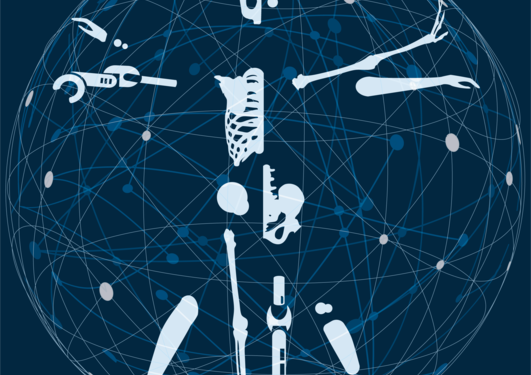- E-mailfartein.nilsen@uib.no
- Phone55589270
- Visitor AddressFosswinckelsgate 65007 Bergen
- Postal AddressPostboks 78025020 Bergen
Fartein is a PhD Candidate in the Department of Social Anthropology at the University of Bergen, where he also earned his Master's degree in Social Anthropology. His scholarly journey includes an in-depth ethnographic study in Iceland, focusing on neopaganism. His master's thesis, "A New Age for Old Gods: An Ethnographic Study of Ásatrúarfélagið in Iceland" delved into how modernity and technological advancements influence religious revivalism, particularly in the context of pagan beliefs in Iceland and the wider Euro-American area.
Currently, for his PhD, Fartein is exploring the social and cultural impacts of generative and conversational Artificial Intelligence in the US. His research aims to understand how these technologies reshape human relationships and notions of kinship, with a specific interest in digital afterlife technologies, AI companions, and virtual humans. He examines their effects on new kin relations and concepts of personhood, using the lenses of digital anthropology and cyborg anthropology.
Fartein's research interests are broad and interdisciplinary, encompassing the Anthropology of Technology, the Anthropology of Religion, Posthumanism, Transhumanism, digital technologies, Artificial Intelligence, New Religious Movements, and the interplay between Science and Religion. These diverse areas converge in his work, offering a unique perspective on the dynamic interplay between technology and human culture.
- (2021). Ghosts in the machine: A study of “digital immortality” technologies and their effect on conceptions of personhood, kinship and life after death in the US.
- (2023). Apokalypse: Science-fiction eller virkelighet?
- (2023). The Machine that Loved Me: Some social implications of virtual humans and digital companions.
- (2023). Navigating Digital Intimacies: Relationships with, through, and around Large Language Models.
- (2022). AI companions and the Future of the Social.
- (2021). Ghosts in the machine?
- (2020). Ei ny tid for gamle gudar: ein etnografisk studie av Ásatrúarfélagið på Island.
- (2020). Kvifor vert folk ásatrúarmenn? Betwixt & Between. 101-124.
- (2022). Chatbotar langt frå så avansert som ChatGPT, kan skape sterke kjensler. Morgenbladet.
- (2022). 12. Liv og død i møte med teknologi.
- (2022). #113: Immortality and Cyborg Anthropology (ft. William Dawley and Fartein Nilsen).
More information in national current research information system (CRIStin)
Fartein's current project, formerly titled "Ghosts in the Machine: A Study of Digital Immortality and its Impact on Kinship, Personhood, and Life After Death in the US," is part of the broader "Technoscientific Immortality: A Study of Human Futures" research initiative at the University of Bergen. The project has been renamed "Kinning With Conversation: An Ethnography of Virtual Humans and Companion AI in the US," reflecting a subtle shift from a focus on death and funerary customs to a broader theoretical exploration of anthropological theories regarding kinship and technology.
The concept of "virtual human" pertains to digital representations of actual or fictional individuals, often crafted using computer graphics and animation methods. These virtual humans serve various purposes, including entertainment, education, and customer service. They can interact with users and exhibit a wide range of emotions and behaviors. With growing investments in this technology, virtual humans are becoming increasingly sophisticated and lifelike.
Originally, the project concentrated on examining how specific groups and individuals in the US use digital technologies, such as virtual humans, in pursuit of immortality. However, during the preliminary fieldwork conducted in late 2022, the term "digital afterlives" emerged as more prevalent than "immortality." Digital afterlives involve using technology to maintain a digital presence for someone after their physical death. This can manifest as virtual worlds, social media profiles, or memorial avatars. Memorial avatars are digital representations created to preserve a person's memory and can interact with others or provide access to digital content, such as photos, videos, and messages. These avatars, often created by loved ones or digital memorial services, can foster a sense of continuity and connection with the deceased. Some may use digital afterlives and memorial avatars to achieve a form of digital immortality by preserving their digital identities and memories beyond physical death.
While examining cultural perspectives on death and immortality in the context of AI remains part of the investigation, the project's primary focus has shifted to encompass a broader range of AI and virtual human interactions, exploring how these are influenced by cultural understandings of kinship. Anthropology has long relied on the study of kinship as a principal method for analyzing social relations. The project will draw upon Sahlins' concept of kinship as "mutuality of being," which posits that kinship systems encompass various forms of intersubjective participations based on shared elements, such as blood, food, milk, bones, genes, or spirit. "Mutuality of being" necessitates a comprehension of what "being" entails: the essence of humanity, the development of personhood, and the constitution of the self in relation to others. In essence, kinship serves as a lens to examine the development of relatedness as kin and the formation of personhood.
Another important notion is Signe Howell's term "kinning," which emphasizes that kin relationships are not solely rooted in biology or marriage, but also in shared experiences, emotions, and memories. Kinning underscores the significance of social and emotional connections in forming and maintaining kin bonds. Consequently, this project aims to investigate how virtual humans, whether as memorial avatars or companion AI, are integrated into pre-existing kinship frameworks, and in some cases, are considered or act as kin. Additionally, the project seeks to explore how creating a memorial avatar might function as a cross-generational bonding experience, such as between grandchildren and their grandparents – an observation made during the preliminary fieldwork in 2022.
To comprehend the intricate relationship between technology and culture, the project will incorporate the analytical frameworks of both digital anthropology and cyborg anthropology. Digital anthropology emphasizes the serious consideration of digital technology's affordances and recognizes its influence on culture and potential for new research methodologies. Cyborg anthropology, on the other hand, highlights the interdependence between humans and machines, acknowledging that technologies act as agents in reproducing social life.
By merging these approaches, the project aspires to achieve a more nuanced understanding of how digital technologies are transforming our relationship with death and dying. This study also aims to open new avenues for experimenting with methodologies within social anthropology. Simultaneously, the project will delve into the broader scope of AI and virtual human interactions and how they are influenced by cultural understandings of kinship, drawing upon anthropological research on kinship to comprehend how AI technologies might give rise to novel forms of personhood and kin relationships.


